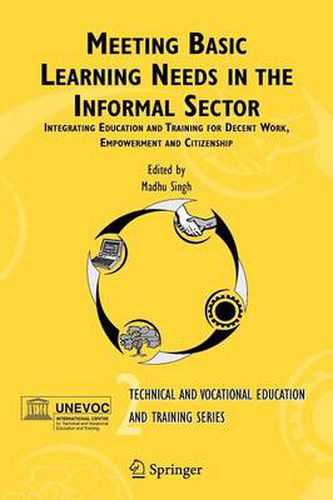Readings Newsletter
Become a Readings Member to make your shopping experience even easier.
Sign in or sign up for free!
You’re not far away from qualifying for FREE standard shipping within Australia
You’ve qualified for FREE standard shipping within Australia
The cart is loading…






This title is printed to order. This book may have been self-published. If so, we cannot guarantee the quality of the content. In the main most books will have gone through the editing process however some may not. We therefore suggest that you be aware of this before ordering this book. If in doubt check either the author or publisher’s details as we are unable to accept any returns unless they are faulty. Please contact us if you have any questions.
This anthology brings together basic facts and features about basic learning needs and skills of people working and living in the informal economy and presents case studies from different countries examining educational and training strategies for meeting these learning needs. It portrays the grave problems facing educational and training systems vis-a-vis informal sector workers, even as they look at holistic solutions that take into account principles of lifelong learning and innovations in informal, non-formal and formal adult learning, and show a growing awareness that education is a human right of fundamental significance to promoting decent work and humane living conditions. The size, diversity, and the strength and sheer tenacity of workers and owners in the informal sector as well as the stress on globalisation and technological changes have combined to bring about a reappraisal of the links between education and training and the informal labour market. The book looks at the interlinkages between EFA and work and takes the stance that promoting the right to basic education is crucial for overcoming oppression and indecent working conditions. Basic education in its current state is not imparting the necessary skills for entry to the labour market. In view of this gap, the case studies pose the crucial question of what essential skills and which basic learning needs have to be addressed for productive and decent work. Although this book mainly provides cases of learning programmes for the informal economy in countries in South Asia, Latin America and Egypt, the lessons learnt have much to offer to researchers, policy makers and practitioners working in other parts of the world .
$9.00 standard shipping within Australia
FREE standard shipping within Australia for orders over $100.00
Express & International shipping calculated at checkout
This title is printed to order. This book may have been self-published. If so, we cannot guarantee the quality of the content. In the main most books will have gone through the editing process however some may not. We therefore suggest that you be aware of this before ordering this book. If in doubt check either the author or publisher’s details as we are unable to accept any returns unless they are faulty. Please contact us if you have any questions.
This anthology brings together basic facts and features about basic learning needs and skills of people working and living in the informal economy and presents case studies from different countries examining educational and training strategies for meeting these learning needs. It portrays the grave problems facing educational and training systems vis-a-vis informal sector workers, even as they look at holistic solutions that take into account principles of lifelong learning and innovations in informal, non-formal and formal adult learning, and show a growing awareness that education is a human right of fundamental significance to promoting decent work and humane living conditions. The size, diversity, and the strength and sheer tenacity of workers and owners in the informal sector as well as the stress on globalisation and technological changes have combined to bring about a reappraisal of the links between education and training and the informal labour market. The book looks at the interlinkages between EFA and work and takes the stance that promoting the right to basic education is crucial for overcoming oppression and indecent working conditions. Basic education in its current state is not imparting the necessary skills for entry to the labour market. In view of this gap, the case studies pose the crucial question of what essential skills and which basic learning needs have to be addressed for productive and decent work. Although this book mainly provides cases of learning programmes for the informal economy in countries in South Asia, Latin America and Egypt, the lessons learnt have much to offer to researchers, policy makers and practitioners working in other parts of the world .